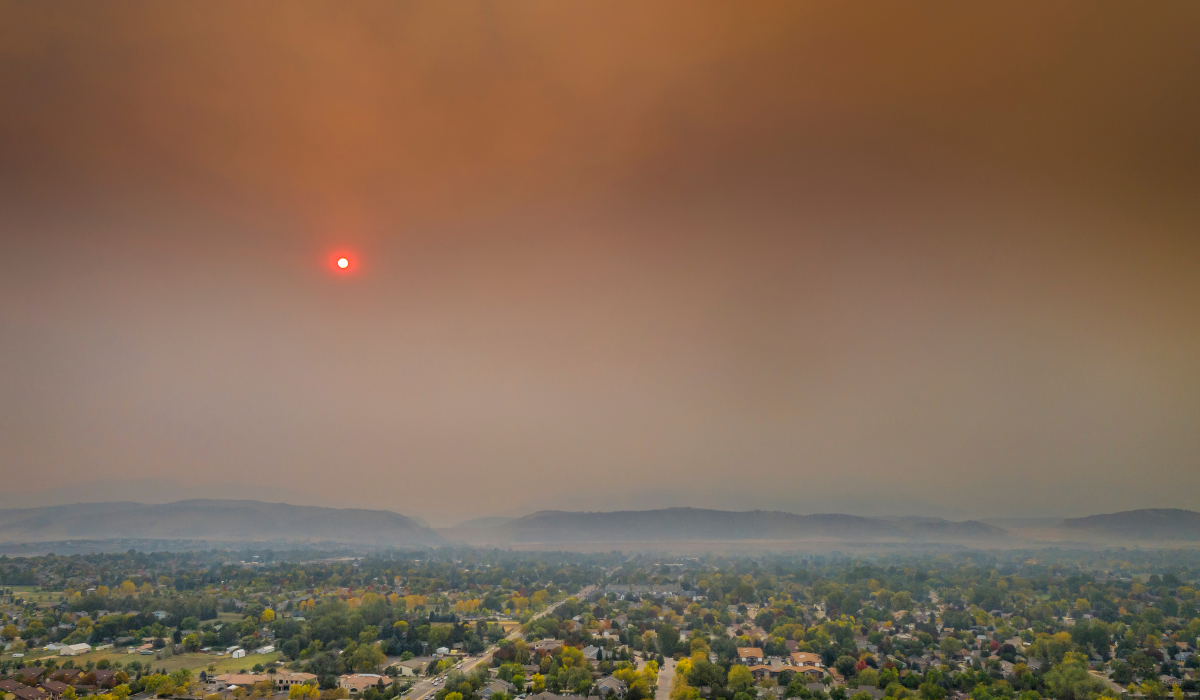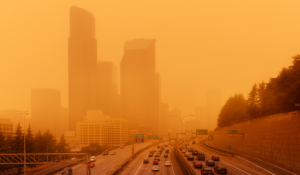By now, there’s a good chance you’ve seen the effects of summer wildfire smoke across the country. The yellowed, dystopian skies of New York City, or the thick, gray clouds that hang above states across the Northeast, as winds carry dangerous smoke hundreds of miles across the country.
As summer approaches, so does the increased risk of wildfires in many regions. So far, in 2023, there have been over 25,000 wildfires in the US alone.
These devastating natural disasters not only pose a threat to the environment and property, but also have a significant impact on human health – particularly, respiratory health.
In a recent development, a wave of Canadian wildfire smoke drifted over the US, dimming blue summer skies and igniting troubling concerns regarding the increasing frequency of fires, and what they have to do with climate change.
These fires have affected air quality on both sides of the border, as more than 500 active wildfires rage across Canada. Many of these fires remain so out of control officials have no choice but to leave them burning.
Here, we’ll explore the connection between summer wildfire smoke and respiratory issues, highlighting the risks and offering practical tips to safeguard your respiratory health during these challenging times.
Let’s break it down.
Related Article: 5 Key Steps to Workplace Emergency Preparedness
Related Article: Protecting Workers from Wildfire Smoke

Smoke Inhalation and Respiratory Problems
One of the most immediate and concerning effects of summer wildfires is smoke inhalation.
The smoke released during wildfires contains a mixture of harmful particles and gases, including carbon monoxide, volatile organic compounds (VOCs), and fine particulate matter known as PM2.5.
These pollutants can irritate the respiratory system and cause a range of health problems.
When individuals are exposed to wildfire smoke, they may experience short-term effects such as coughing, wheezing, and throat irritation.
Those with pre-existing respiratory conditions like asthma or chronic obstructive pulmonary disease (COPD) are particularly vulnerable and may experience exacerbated symptoms.
Prolonged exposure to wildfire smoke can lead to more severe respiratory issues such as bronchitis, aggravated asthma, and even respiratory distress syndrome.
Protecting Your Respiratory Health from Wildfire Smoke
While it may be challenging to completely avoid exposure to wildfire smoke during these events, there are steps you can take to protect your respiratory health.
Here are some practical tips to consider:
Stay Informed: Keep yourself updated on local wildfire conditions through official sources such as emergency management agencies or local news. Stay informed about air quality reports and wildfire evacuation protocols to make informed decisions about outdoor activities.
See OSHA guidelines on wildfires [response/recovery].
See additional OSHA resources on wildfires.
Minimize Outdoor Exposure: When wildfire smoke is present, limit your time spent outdoors, especially during periods of poor air quality.
Stay indoors as much as possible, keeping windows and doors closed to prevent smoke from entering your home. Use air purifiers or HVAC systems with high-efficiency filters to improve indoor air quality.
Use Personal Protective Equipment (PPE): When outdoor exposure is unavoidable, consider wearing a properly fitted N95 or N99 mask.
These masks can help filter out fine particles and reduce the amount of smoke you inhale. Ensure that the mask forms a tight seal, and follow manufacturer guidelines for usage and disposal.
Create a Clean Indoor Environment: Maintain a clean indoor environment by regularly vacuuming with a HEPA filter-equipped vacuum cleaner, which can trap fine particles. Keep surfaces dust-free, as smoke particles can settle on furniture and other objects.
Stay Hydrated: Drink plenty of water to stay hydrated, as smoke exposure can cause throat and nasal dryness.
Staying hydrated helps keep the respiratory system moist and aids in removing irritants.
Seek Medical Advice: If you experience persistent respiratory symptoms or notice a worsening of existing conditions during or after a wildfire event, consult a healthcare professional.
They can provide guidance, prescribe appropriate medications, and recommend further actions to protect your respiratory health.
Supporting Vulnerable Populations
Certain groups are more susceptible to the adverse effects of wildfire smoke. It is essential to take additional precautions to protect vulnerable populations, including:
Children and the Elderly: Children’s respiratory systems are still developing, and older adults may have weakened immune systems. Limit their exposure to smoke, ensure proper ventilation in their living spaces, and consult healthcare professionals for specific guidance.
Pregnant Women: Pregnant women should also be cautious and minimize exposure to wildfire smoke to protect both their health and the health of the developing fetus.
Individuals with Pre-existing Respiratory Conditions: Those with asthma, COPD, or other respiratory conditions should follow their existing management plans and medications prescribed by their healthcare providers.
It’s important to have an adequate supply of necessary medications on hand in case of emergencies.
Key Takeaways
The smoke and pollutants caused by summer wildfires can have a significant impact on respiratory health.
Protecting your respiratory health during these events requires a proactive approach. Stay informed about wildfire conditions, minimize outdoor exposure, use appropriate personal protective equipment, maintain clean indoor environments, and seek medical advice if needed.
Additionally, pay special attention to vulnerable populations such as children, the elderly and pregnant women.
By taking these precautions and staying vigilant, you can help safeguard your respiratory health and minimize the adverse effects of summer wildfires.
Remember, your health and well-being should always be a top priority, especially during challenging times when wildfires pose a threat to respiratory health.
***
About Worksite Medical
In most cases, OSHA requires medical surveillance testing, and at no cost to employees.
Worksite Medical makes that program easier with mobile medical testing.
We conduct on-site respirator fit tests, as well as audiometric exams, pulmonary function tests and heavy metal lab work, right on your job site. We also keep accurate, easy-to-access medical records for your convenience. You’ll keep your employees at work, and stay ahead of OSHA inspections.




